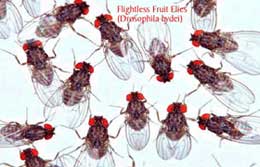Dr Douglas Armstrong and his team at Edinburgh University have received a Nasa grant to breed several generations of fruit flies in zero gravity and then examine any genetic changes in the insects.

The project is the first step towards discovering whether mankind can survive for generations in space and establish permanent homes elsewhere in the solar system.
“Genes are prone to change in increased and lowered gravity. While on earth it is possible to increase gravity by spinning the flies in a centrifuge, it is much harder to reduce it. The only place to do that is in space,” explains the scientist.
The first generation of flies will be launched as eggs before hatching on the International Space Station.
Scientists at the space agency have constructed a special insect habitat where the flies (normal ones but also some mutants who do not sense gravity) will live and where they can be watched by 24 digital cameras using computer tracking normally employed by the police to follow suspects.
The flies will then be frozen before being sent back to earth, where the researchers can analyse which genes have become more active or less active while in orbit.
Scientists believe that if the genetic changes from space travel accumulate from generation to generation, then settlers on other planets may kickstart another round of human evolution.
Via Scotsman.
Related: Animal astronauts.
